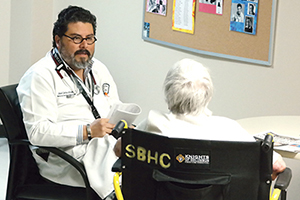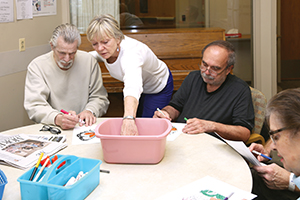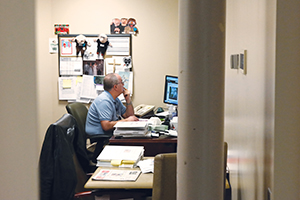By JULIE MINDA
An analysis that AMITA Health Alexian Brothers Medical Center in Elk Grove Village, Ill., conducted several years ago revealed that, with state psychiatric hospitals closing, and with many community hospitals eliminating psychiatric services, mental health services were increasingly limited for people in the hospital's suburban Chicago service area.
There was a particular concern about access for the region's growing population of senior adults, according to Clayton Ciha, president and chief executive of AMITA Health Alexian Brothers Behavioral Health Hospital in Hoffman Estates, Ill. He said that although behavioral health "is not the easiest service line to embrace," AMITA Health Alexian Brothers took on the challenge "because as a Catholic organization, we always go towards the issues."
The Elk Grove Village hospital is among the Catholic providers that have opened inpatient geropsychiatric units in recent years, to simultaneously address the complex psychiatric and medical conditions of older adults. Ciha said success relies on administrators and staff having "a strong commitment to behavioral health and to caring for older adults.

Monica Slattery, an occupational therapist, conducts a group session in the geriatric psychiatry unit at St. Vincent Charity Medical Center of Cleveland. Also pictured is Scott Shurdell, a nursing student and caregiver at St. Vincent Charity Surgery Center at Rockside.
"You need to have compassion and care. We take that very seriously," he said.
Complex comorbidities
Ciha said AMITA Health Alexian Brothers opened its 25-bed geropsychiatric unit at the Elk Grove Village medical center in mid-2014 because it recognized that older adults have different needs than other psychiatric populations, and because it understood "people feel better when they're treated with others with similar conditions and of a similar age."
He said he's seeing increasing numbers of these geriatric units opening — including at standalone psychiatric hospitals and community hospitals — because of the aging of the population and the recognition of elders' particular psychological, emotional, medical and physical needs.
According to a 2012 Institute of Medicine study, "The Mental Health and Substance Use Workforce for Older Adults: In Whose Hands?," an estimated 5.6 million to 8 million adults aged 65 and older had one or more defined mental health or substance abuse condition, with depressive disorders and dementia-related conditions most prevalent. "Many older adults who have mental health/substance abuse conditions also have acute and chronic physical health conditions, and some have cognitive and functional impairments," the study said.
The study noted that changes and conditions common in old age can make older adults particularly vulnerable to mental health and substance abuse problems. For instance, metabolic changes can increase elders' vulnerability to the effects of alcohol and drug use; loss and grief can trigger or worsen depression; medications commonly prescribed to the elderly can cause and exacerbate mental health and substance abuse conditions and "cognitive and functional impairments can complicate the detection and diagnosis of mental health and substance abuse conditions."

On his daily rounds, Dr. Juan Carlos Urizar, a neuropsychiatrist, talks with a patient undergoing treatment at CHRISTUS Santa Rosa Hospital – Medical Center's Senior Behavioral Health Center in San Antonio. A photo montage on the wall of movie stars popular in the 1950s and 1960s can stir patients' memories.
Advanced old age
Dr. Renato De Los Santos is a psychiatrist and medical director of older adult services for AMITA Health Alexian Brothers. He said that as people with psychiatric conditions age, their conditions normally become more complex. He said this is because the medical and psychological comorbidities that tend to accrue as people age make their clinical profiles increasingly complicated and difficult to assess.
De Los Santos noted that because of this increasing complexity, and also because people grow increasingly dependent as their health deteriorates, their needs escalate and change as they age. A patient in her late 80s likely will need much more structure, support and monitoring in a psychiatric facility, as compared with a senior adult in her 60s, he said.
Dr. Boris Royak is medical director of a 16-bed geropsychiatric unit that Cleveland's St. Vincent Charity Medical Center opened a year ago. He added that older patients may also be at higher risk for falls, and the clinical focus may need to shift accordingly. He said, too, that "cognitive deficits may affect presentation of patients' emotional and behavioral symptoms, and so forth."

Janine Stewart, nursing director of AMITA Health Alexian Brothers Behavioral Health Hospital, Hoffman Estates, Ill., assists with an art therapy group session held at that facility's geriatric psychiatric inpatient unit.
Vulnerable on multiple fronts
Roark Hayes is program director of a 19-bed geropsychiatric unit that CHRISTUS Santa Rosa Hospital–Medical Center of San Antonio opened in 2013. He said life experiences may trigger or worsen mental health conditions for seniors. Many have outlived family and friends; they may be outliving their savings too. "They may feel helpless and hopeless. They may be noncompliant with medications, for a variety of reasons."
Additionally, senior adults may require different therapeutic approaches, as compared to younger psychiatric patients, said Royak. For instance, patients with dementia may not be candidates for memory-dependent talk therapy.
Older psychiatric patients usually require the simultaneous treatment of chronic medical issues, such as diabetes, and many require help with the activities of daily living. St. Vincent Charity's unit uses occupational therapy, recreational therapy and coaching by nurses and occupational therapists to help patients compensate for physical limitations. They also ensure patients are active enough to sustain muscle tone and coordination and to avoid blood clots or other complications that can occur with long periods of inactivity.
CHRISTUS Santa Rosa's Hayes said while symptom and treatment differentiators make a strong case for separating older psychiatric inpatients from younger ones, another important reason for the separation is that the younger psychiatric patients "can be intimidating to older adults, and if they act out, that can be problematic. It can make seniors fearful they'll be hurt."
The geropsychiatric units at AMITA Health Alexian Brothers, CHRISTUS Santa Rosa and St. Vincent Charity all receive patients with acute psychiatric concerns and from a variety of settings. Most patients come from some type of long-term care setting; others come from their homes. Royak explained most elder care facilities do not have staff who are trained to safely manage and modify the behaviors of residents who become aggressive against staff or other patients, or are highly agitated.
Two-pronged assessment
De Los Santos said the key to treatment is to arrive at the most accurate, comprehensive and specific diagnosis and treatment goals possible. This way, the recommended interventions can be of benefit when patients are in the unit and provide for continuity of treatment when the patient receives follow-up care from other providers.
AMITA Health Alexian, CHRISTUS Santa Rosa and St. Vincent Charity all perform thorough medical and psychiatric assessments of patients upon admission. All three units use a tailored mix of group therapy, individual therapy, medication management and other interventions to stabilize patients and prepare them and their families for a successful transition out of the unit, generally within a few days to a few weeks of admission.
All three units use multidisciplinary teams — with some members dedicated to the unit, and some shared with other hospital departments. All three units have dedicated psychiatrists who specialize in the geriatric population as well as nurses and social workers trained in medical and psychiatric care for elders. All three units offer spiritual care.
Oftentimes, experts with all three facilities said, clinicians determine patients are suffering from adverse drug interactions and determine that their medication list can be safely trimmed. Some medications to treat medical conditions may exacerbate a psychiatric condition — or vice versa. Clinicians check — and if needed, correct — dosing and reaffirm the medical necessity for each drug on a patient's formulary before discharge.

Roark Hayes, program director of CHRISTUS Santa Rosa Hospital — Medical Center's Senior Behavioral Health Center, works at his desk.
The units' main focus is to ensure patients are ready for their next destination. Many patients can return to the setting they came from, but some will step up on the care continuum, say from their home to assisted living, or from one unit in a nursing home to a specialty unit.
Rock steady commitment
Hayes, of CHRISTUS Santa Rosa, said it can be very challenging to create a successful inpatient geropsychiatric program at a hospital because such programs are very labor and resource intensive. It takes years to recruit and hire a properly experienced and trained staff, but Medicare pays on a per diem basis — so it's difficult to build up a program while relying on limited reimbursements. The hospital has chosen to invest in the unit because "we understand it's our mission to extend the ministry of Jesus."
Copyright © 2016 by the Catholic Health Association
of the United States
For reprint permission, contact Betty Crosby or call (314) 253-3477.